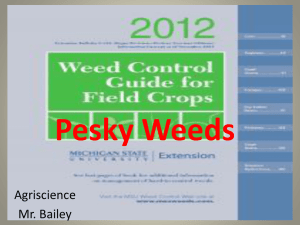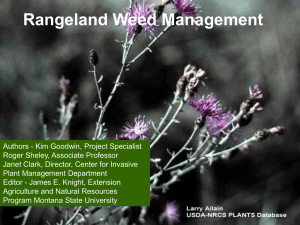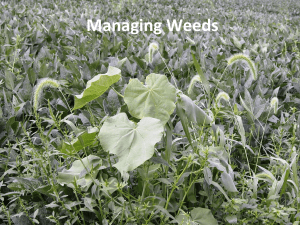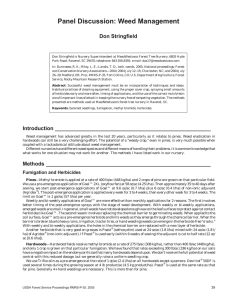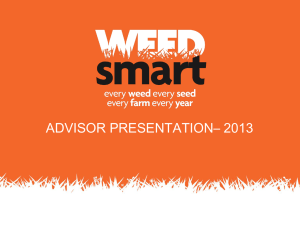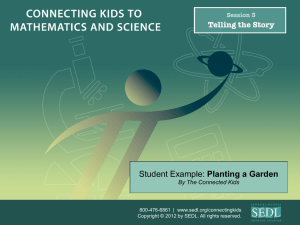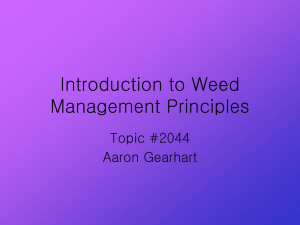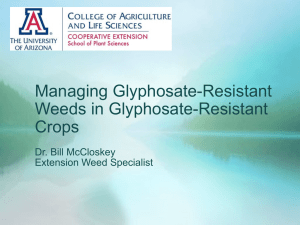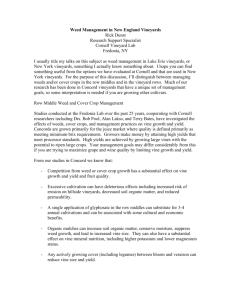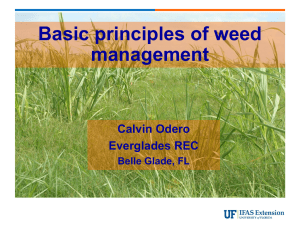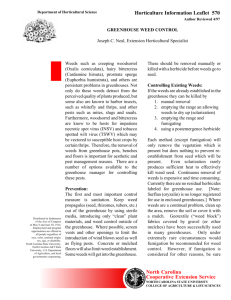Plant Science 352 – Weed Science
advertisement
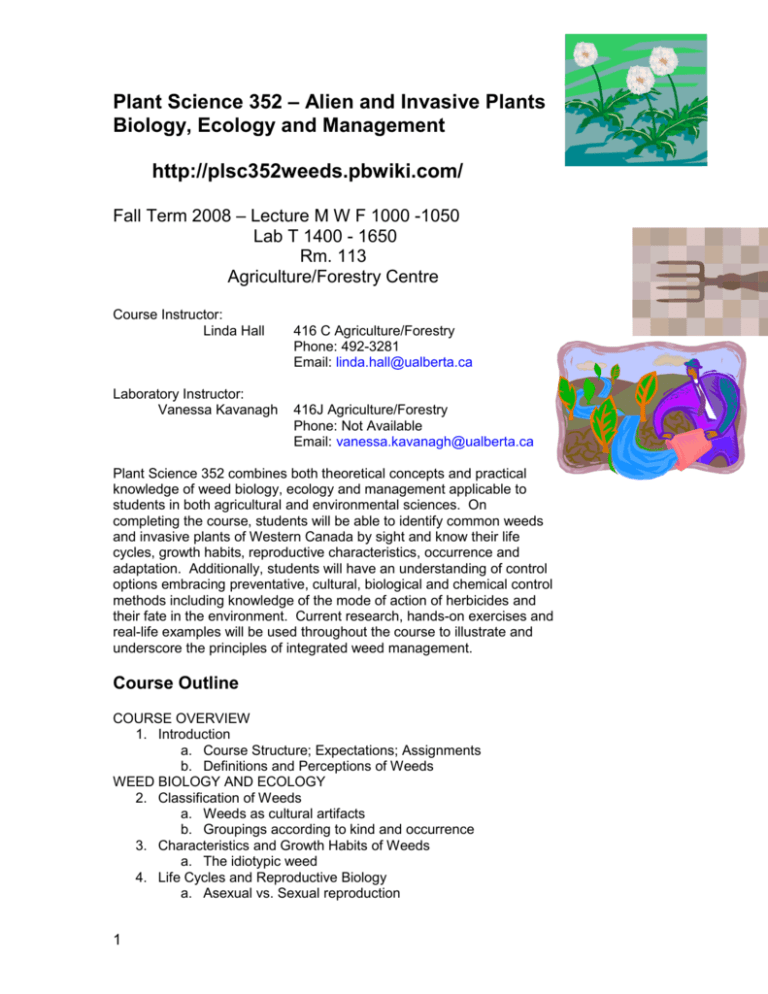
Plant Science 352 – Alien and Invasive Plants Biology, Ecology and Management http://plsc352weeds.pbwiki.com/ Fall Term 2008 – Lecture M W F 1000 -1050 Lab T 1400 - 1650 Rm. 113 Agriculture/Forestry Centre Course Instructor: Linda Hall Laboratory Instructor: Vanessa Kavanagh 416 C Agriculture/Forestry Phone: 492-3281 Email: linda.hall@ualberta.ca 416J Agriculture/Forestry Phone: Not Available Email: vanessa.kavanagh@ualberta.ca Plant Science 352 combines both theoretical concepts and practical knowledge of weed biology, ecology and management applicable to students in both agricultural and environmental sciences. On completing the course, students will be able to identify common weeds and invasive plants of Western Canada by sight and know their life cycles, growth habits, reproductive characteristics, occurrence and adaptation. Additionally, students will have an understanding of control options embracing preventative, cultural, biological and chemical control methods including knowledge of the mode of action of herbicides and their fate in the environment. Current research, hands-on exercises and real-life examples will be used throughout the course to illustrate and underscore the principles of integrated weed management. Course Outline COURSE OVERVIEW 1. Introduction a. Course Structure; Expectations; Assignments b. Definitions and Perceptions of Weeds WEED BIOLOGY AND ECOLOGY 2. Classification of Weeds a. Weeds as cultural artifacts b. Groupings according to kind and occurrence 3. Characteristics and Growth Habits of Weeds a. The idiotypic weed 4. Life Cycles and Reproductive Biology a. Asexual vs. Sexual reproduction 1 b. Mating systems c. Relevance to Weed Management Systems 5. Dispersal Mechanisms of weed propagules 6. Seed banks a. Dormancy and longevity b. Periodicity of Germination c. Germination Requirements and Seedling Recruitment 7. Invasive Species and Alien Invaders a. Principles of invasiveness b. Environmental implications 8. Crop/Weed Interference a. Principles of competition b. Factors influencing competitiveness 9. Acts, Regulations and Organizations a. Federal Seeds Act i. Weed Seeds Order b. Canadian Food Inspection Agency c. Canadian Seed Growers Association & Canadian Seed Institute d. Provincial Weed Control Act i. Weed Designation Regulation ii. Seed Cleaning Plant Regulation e. Environmental Protection and Enhancement Act WEED CONTROL, PRINCIPLES AND TOOLS 10. Biological control a. Principles of classical biocontrol b. Current status c. Weeds, bugs, mice and men 11. Cultural and Management Practices influencing weed populations a. Crop rotations b. Direct Seeding & Tillage c. Grazing systems & Reclamation practices 12. How Herbicides Work a. Introduction to herbicides b. Uptake, translocation and metabolism c. Herbicide groups 13. Factors affecting herbicide performance a. Plant growth stage and timing of application b. Environmental factors 14. Herbicide formulation and application 15. Impact of herbicides on the environment a. Herbicides in soil b. Environmental fate of herbicides c. Toxicology 16. Herbicide resistance in weeds 17. Herbicide resistant crops 18. Reducing herbicide use a. Estimating crop losses from weeds 2 b. Strategies to reduce herbicide use c. Crop scouting exercise INTEGRATED PRACTICES – COMBINING MANAGED SYSTEMS, BIOLOGY AND CONTROL 19. Principles of integrated weed management 20. Weeds in Rangelands 21. Weed control in reclaimed areas 22. Weeds in Forages (Guest Lecture, Dan Cole, AAFRD) 23. Weeds in Canola 24. Weed Control in Organic Systems Required Texts: Bubar, C.J., S.J. McColl and L.M. Hall. 2000. Weeds of the Prairies. Alberta Agriculture, Food and Rural Development. 266 pp. Weed Seedling Guide: Early Identification of Grass and Broad-leaved Weeds. 1996. Alberta Agriculture, Food and Rural Development. 62 pp. Hall, L.M., H. Beckie and T.M. Wolf. 1999. How Herbicides Work: Biology to Application. Alberta Agriculture, Food and Rural Development. 134 pp. Grading Scheme: Examination Lecture Mid-term Exam Class Projects Final Exam Laboratory Bi-weekly quizzes Lab Final Exam Total % of Grade Date 15 15 35 October 17, 2008 See Class Calendar - Wiiki Dec 10, 9:00 am 15 20 100 See Class Calendar - Wiiki December 1, 2008 Grade Distribution: Grades will be converted to letter grades using a distribution as outlined in the 2007-2008 University of Alberta Calendar, taking into account both absolute achievement and relative performance in the class, such that the median final grade for the class will approximate a B. Policy respecting late assignments: For each day an assignment is past the due date, 5% will be deducted from the student’s grade on that assignment for up to 7 days and for a maximum deduction of 35%. Assignments will not be accepted if they 3 are submitted more than 7 days past the due date in which case a grade of 0 will be recorded. In cases where a student has a bona-fide reason for missing a due date, e.g. illness supported by a medical certificate, the instructors will exercise discretion in deducting grades. If, for any reason, a student anticipates being unable to submit an assignment on the due date, s/he should contact the course advisor as early in advance as possible. Academic Integrity “The University of Alberta is committed to the highest standards of academic integrity and honesty. Students are expected to be familiar with these standards regarding academic honesty and to uphold the policies of the University in this respect. Students are particularly urged to familiarize themselves with the provisions of the Code of Student Behaviour (www.ualberta.ca/secretariat/appeals.htm) and avoid any behaviour which could potentially result in suspicions of cheating, plagiarism, misrepresentation of facts and/or participation in an offence. Academic dishonesty is a serious offence and can result in suspension or expulsion from the University.” (GFC 2003) Code of Student Behaviour “All students at the University of Alberta are subject to the Code of Student Behaviour, as outlined at http://www.ualberta.ca/~unisecr/policy/sec30.html. Please familiarize yourself with it and ensure that you do not participate in any inappropriate behavior as defined by the Code. Key components of the code include the following statements. 30.3.2(1) No Student shall submit the words, ideas, images or data of another person as the Student’s own in any academic writing, essay, thesis, project, assignment, presentation or poster in a course or program of study. 30.3.2(2) c. No Student shall represent another’s substantial editorial or compositional assistance on an assignment as the Student’s own work.” Just for fun The Amazing Seed Race Plant Survivor 4
